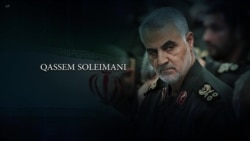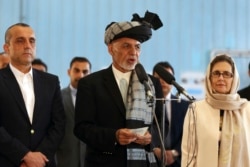The killing of Qassem Soleimani in a U.S. airstrike Friday is a devastating blow to pro-Iranian militias across the Middle East, some experts said, warning that the militia groups could turn the region into further chaos through retaliation violence.
The powerful Iranian general, along with Iraqi Shiite militia leader Abu Mahdi al-Muhandis and several other aides, was struck at the Iraqi Baghdad airport in a U.S. operation directed by President Donald Trump. The killing has been received with rage among the Shiite groups, with the Iranian government vowing “a crushing revenge” against the U.S.
“Iran’s web of patron-client relationships and proxies was largely Soleimani’s creation, and it was he who brilliantly developed and managed these relationships to Tehran’s advantage,” said Jonathan Spyer, a research fellow at Philadelphia-based think tank the Middle East Forum.
Spyer said that Soleimani used informal relations developed over a long period of time with Shiite militia leaders across the Middle East. Such relationships, he added, cannot easily be bequeathed to a successor.
Iran’s Supreme Leader Ayatollah Ali Khamenei Friday appointed Brigadier-General Esmail Ghaani to replace Soleimani as the new commander of the Islamic Revolutionary Guard Corps-Quds Force. Khamenei said in a statement that Ghaani was among “the most prominent” IRGC commanders and will continue Soleimani’s path in directing the Quds Force.
Influence on Shiite Crescent
The Quds Force is an IRGC unit responsible for undertaking Iran’s external operations to advance the Islamic regime’s revolutionary values. Under Soleimani’s command, the unit has succeeded in expanding Iran’s influence in the so-called Shiite Crescent, a term referring to a crescent-shaped region in the Middle East where Shiite communities reside.
Max Abrahms, a nonresident fellow at the Quincy Institute, a Washington-based think tank, told VOA that Soleimani had made sure militant actions by Shiite groups were carefully assessed.
“Although it is very understandable that Soleimani would be associated with violence, what people don’t understand is that the IRGC could have produced over the years much more violence in many more places against a variety of different targets, but chose not to, and the reason is because the leader did not give a green light,” Abrahms said.
“What concerns me is now that we’ve taken out Soleimani, we are going to see an uptick in violence that will be more indiscriminate than in the past,” he added.
‘Master of resistance’
In Lebanon, where Iran has empowered Shiite Hezbollah group since its founding in 1985, the group’s head, Hassan Nasrallah, Friday mourned Soleimani as a “master of resistance.”
“To continue on General Soleimani’s path, we’ll raise his flag in all battlefields,” Hezbollah-linked al-Manar website quoted him as saying.
According to the Atlantic Council’s senior fellow Nicholas Blanfold, Hezbollah’s extensive networks across the Middle East, Latin America, Europe and Africa make it indispensable for Iran’s global outreach.
The Iranian regime “through the networks, particularly Hezbollah, which has a global reach, could affect a kind of retaliatory operation almost anywhere around the world,” Blanfold told VOA.
$700 Million
U.S. officials say that Iran for years has funded Hezbollah with an estimated $700 million annually. The funds and arms support have helped the group sustain years of violence against Israel, they said.
In Iraq, experts say Soleimani played a decisive role in organizing Shiite militias following the U.S. invasion in 2003 and the rise of the Islamic State in 2014.
“What you’ve lost basically is the brain, he is the brain of Shia militias in Iraq,” said Boston-based Iraq military expert Michael Knights of the Washington Institute. He added that Soleimani played a role as a centralizing force to unify some 50 militias that would have been otherwise divided under the umbrella of Iraqi Popular Mobilization Forces.
“It’s going to open up a lot of opportunity, rivalry and competition. If Muhandis died on his own, they would have turned to Soleimani to tell them who is the next leader. Losing them both is really a time of fracture for them,” he told VOA.
Repercussions in Iraq
Babak Taghvaei, a Malta-based military analyst, told VOA that some Iraqi Shiite militias with nationalist sentiments in the past have shown their willingness to drift away from Iran. Soleimani’s death provides Iraqi leaders an opportunity to encourage those to join the democratic system in the future, Taghvaei argued.
“Many of the PMF commanders will decide to stop militant activity and will join the world of politics while the radicals will follow orders of new commander of IRGC-Quds Force and will pursue more extremist tactics to confront U.S. troops that will include bombings,” he told VOA.
According to Sam Bazzi, the director of Washington-based Islamic Counterterrorism Institute, Iran also will likely attempt to leverage its influence in Yemen’s conflict to pressure the U.S. and its Arab Gulf allies in the wake of recent escalations.
Iran’s regime since 2015 has increased its support of Houthi rebels against the Saudi-backed government. The Shiite rebels in the past have fired several missiles into Saudi Arabia, which, according to Saudi officials, are supplied to them directly by Iran.
“The Houthis could storm Najran [a city in southwest] in Saudi Arabia, and/or attack commercial vessels or military ships in Bab al-Mandab Strait, and/or launch missiles or attack drones deep into the Saudi territory, targeting critical infrastructure in the kingdom,” Bazzi said, adding, “Khamenei won’t rest before he delivers his publicly pledged revenge.”
Afghanistan
Should the tensions between Iran and the U.S. escalate, violence could expand to also include countries like Afghanistan, warned the former Afghan general Ateequllah Amerkhail.
“America and Iran need to keep Afghanistan out of it! They [Iran] will pressure America by supporting the Taliban in Afghanistan. Iran will intensify the conflict by supporting the Taliban,” Amerkhail told VOA.
Following a telephone conversation with the U.S. Secretary of State Mike Pompeo Friday, Afghan President Ashraf Ghani posted in Dari from his official Twitter account that “Afghan soil would not be used against a third country.”
Iran has been accused of supporting Shiite militant groups in Afghanistan and Pakistan in recent years. Some experts warn that the country could encourage the Taliban group to end peace talks that intensified in late 2018.
“It may pose an obstacle if Tehran seeks to use the Taliban as a proxy to attack U.S. forces,” said Michael Kugelman, the director for the Asia Program at the Wilson Center. “Let’s not forget — there are still 12,000 U.S. troops in Afghanistan and there is a precedent for Iran providing some levels of support to the Taliban,” he told VOA.
According to Fatemeh Aman, a senior fellow at the South Asia Center at the Atlantic Council, while a full-scale war between Iran and the U.S. is possible, it is likely that the Iranian leadership will limit its retaliation and avoid classical warfare with the U.S. and its allies.
“Definitely without a doubt there is going to be more violence but we don’t know the extent of Iran’s response. Iranians will likely wait and see because they know they cannot compete with the military strength of the United States. But violence towards the U.S. or wherever the U.S. has a base will definitely increase,” she told VOA.
VOA’s Rikar Hussein, Ezel Sahinkaya, Mehdi Jedinia, Niala Mohammad, Sirwan Kajjo, Asim Kashgarian contributed to this report from Washington.









